The Intel Core i9-9980XE CPU Review: Refresh Until it Hertz
by Ian Cutress on November 13, 2018 9:00 AM ESTHEDT Performance: Encoding Tests
With the rise of streaming, vlogs, and video content as a whole, encoding and transcoding tests are becoming ever more important. Not only are more home users and gamers needing to convert video files into something more manageable, for streaming or archival purposes, but the servers that manage the output also manage around data and log files with compression and decompression. Our encoding tasks are focused around these important scenarios, with input from the community for the best implementation of real-world testing.
All of our benchmark results can also be found in our benchmark engine, Bench.
Handbrake 1.1.0: Streaming and Archival Video Transcoding
A popular open source tool, Handbrake is the anything-to-anything video conversion software that a number of people use as a reference point. The danger is always on version numbers and optimization, for example the latest versions of the software can take advantage of AVX-512 and OpenCL to accelerate certain types of transcoding and algorithms. The version we use here is a pure CPU play, with common transcoding variations.
We have split Handbrake up into several tests, using a Logitech C920 1080p60 native webcam recording (essentially a streamer recording), and convert them into two types of streaming formats and one for archival. The output settings used are:
- 720p60 at 6000 kbps constant bit rate, fast setting, high profile
- 1080p60 at 3500 kbps constant bit rate, faster setting, main profile
- 1080p60 HEVC at 3500 kbps variable bit rate, fast setting, main profile
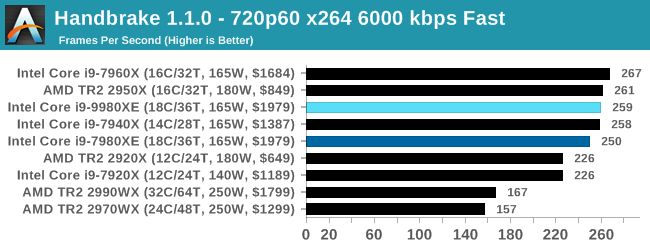
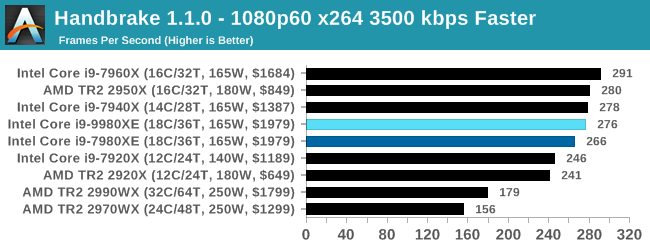
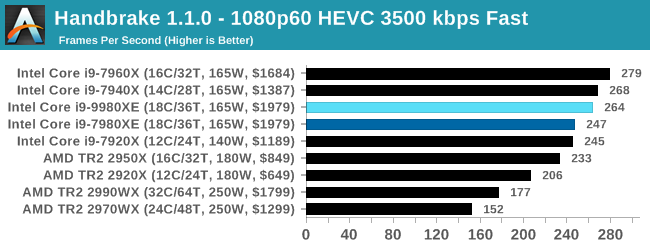
The 9980XE performs better than the 7980XE in our testing by a few percentage points, however these tests seem to benefit from fewer cores and a better turbo frequency profile.
7-zip v1805: Popular Open-Source Encoding Engine
Out of our compression/decompression tool tests, 7-zip is the most requested and comes with a built-in benchmark. For our test suite, we’ve pulled the latest version of the software and we run the benchmark from the command line, reporting the compression, decompression, and a combined score.
It is noted in this benchmark that the latest multi-die processors have very bi-modal performance between compression and decompression, performing well in one and badly in the other. There are also discussions around how the Windows Scheduler is implementing every thread. As we get more results, it will be interesting to see how this plays out.
Please note, if you plan to share out the Compression graph, please include the Decompression one. Otherwise you’re only presenting half a picture.
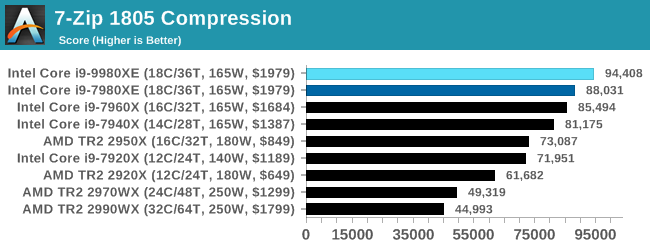
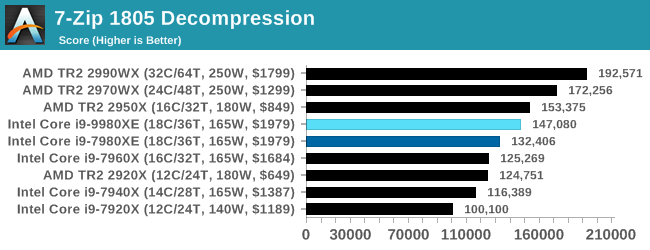
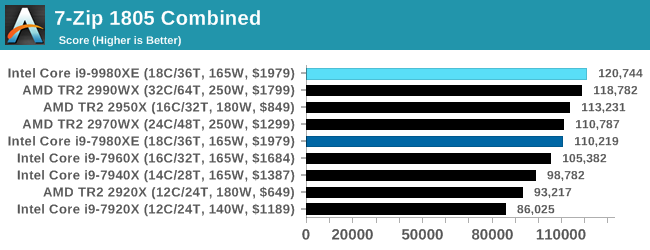
The increase in performance in both compression and decompression over the 7980XE pushes the 9980XE to the top of the overall standings.
WinRAR 5.60b3: Archiving Tool
My compression tool of choice is often WinRAR, having been one of the first tools a number of my generation used over two decades ago. The interface has not changed much, although the integration with Windows right click commands is always a plus. It has no in-built test, so we run a compression over a set directory containing over thirty 60-second video files and 2000 small web-based files at a normal compression rate.
WinRAR is variable threaded but also susceptible to caching, so in our test we run it 10 times and take the average of the last five, leaving the test purely for raw CPU compute performance.
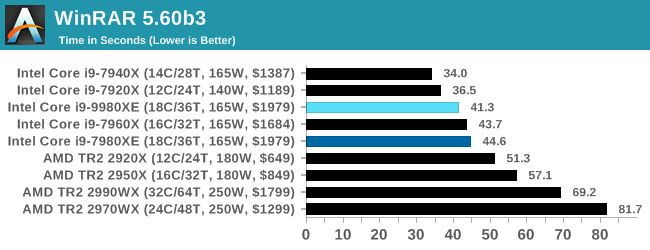
With WinRAR being a variable threaded and memory sensitive tool, while the 9980XE performs better than the 7980XE, having fewer Intel cores seems to work best.
AES Encryption: File Security
A number of platforms, particularly mobile devices, are now offering encryption by default with file systems in order to protect the contents. Windows based devices have these options as well, often applied by BitLocker or third-party software. In our AES encryption test, we used the discontinued TrueCrypt for its built-in benchmark, which tests several encryption algorithms directly in memory.
The data we take for this test is the combined AES encrypt/decrypt performance, measured in gigabytes per second. The software does use AES commands for processors that offer hardware selection, however not AVX-512.
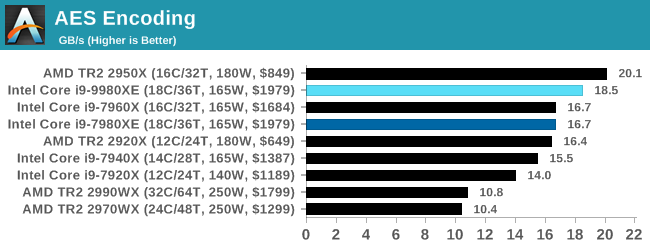
AES encoding seems to prefer AMD's situation, although the way the >16 core TR2 parts are configured is more of a hindrance. As expected, the i9-9980XE is the best Intel performer here.










143 Comments
View All Comments
Cellar Door - Tuesday, November 13, 2018 - link
The best part is that an i7 part(9800X) is more expensive then a i9 part(9900k). Intel smoking some good stuff.DigitalFreak - Tuesday, November 13, 2018 - link
You're paying more for those extra 28 PCI-E lanesHixbot - Tuesday, November 13, 2018 - link
And much more L3. It's also interesting that HEDT is no longer behind in process node.Hixbot - Tuesday, November 13, 2018 - link
And AVX512eastcoast_pete - Tuesday, November 13, 2018 - link
@Ian: Thanks, good overview and review!Agree on the "iteration when an evolutionary upgrade was needed"; it seems that Intel's development was a lot more affected by its blocked/constipated transition to 10 nm (now scrapped), and the company's attention was also diverted by its forays into mobile (didn't work out so great) and looking for progress elsewhere (Altera acquisition). This current "upgrade" is mainly good for extra PCI-e lanes (nice to have more), but it's performance is no better than the previous generation. If the new generation chips from AMD are halfway as good as they promise, Intel will loose a lot more profitable ground in the server and HEDT space to AMD.
@Ian, and all: While Intel goes on about their improved FinFet 14 nm being the reason for better performance/Wh, I wonder how big the influence of better heat removal through the (finally again) soldered heat spreader is? Yes, most of us like to improve cooling to be able to overclock more aggressively, but shouldn't better cooling also improve the overall efficiency of the processor? After all, semiconductors conduct more current as they get hotter, leading to ever more heat and eventual "gate crashing". Have you or anybody else looked at performance/Wh between, for example, an i7 8700 with stock cooler and pasty glued heat spreader vs. the same processor with proper delidding, liquid metal replacement and a great aftermarket cooler, both at stock frequencies? I'd expect the better cooled setup to have more performance/Wh, but is that the case?
Arbie - Tuesday, November 13, 2018 - link
The "Competition" chart is already ghastly for Intel. Imagine how much worse it will be when AMD moves to 7 nm with Zen 2.zepi - Tuesday, November 13, 2018 - link
How about including some kind of DB test?I think quite a few people are looking at these workstation class CPU's to develop BI things and it might quite helpful to actually measure results with some SQL / NoSQL / BI-suites. Assuming bit more complex parallel SQL executions with locking could show some interesting differences between NUMA-Threadrippers and Intels.
GreenReaper - Wednesday, November 14, 2018 - link
It's a good idea, Phoronix does them so in the short term you could probably look there.jospoortvliet - Friday, November 16, 2018 - link
But then make sure it is realistic, not running in cache or such... A real db suitable for these chips is terabytes, merely keeping the index in ram... rule of thumb: if your index fits in cache your database doesn't need this CPU ;-)FunBunny2 - Tuesday, November 13, 2018 - link
I guess I can run my weather simulation in Excel on my personal machine now. neato.